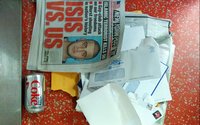
I don’t see how I
can fill in for Wayne Friedman on today’s “TV Watch” and not acknowledge Sunday’s massacre at the Pulse nightclub in Orlando. I call it a massacre, because that is what it was.
To call it something else -- “attacks,” or even “terrorist attacks” -- reduces it to a media meme of mass shootings all lumped together on a spectrum that ranges from the
lunatic fringe to existential threats.
Already media coverage is conflating Pulse with everything from Sandy Hook (a lone lunatic) to 9/11 and the ISIS directed or inspired Paris and
San Bernardino massacres.
While the culprit said he was acting on behalf of ISIS, there already is evidence suggesting he may have had other issues. I call him a culprit, because
calling him anything more gives media weight to his actions -- and that is not something I want to contribute to.
advertisement
advertisement
It’s something I’ve been thinking about my whole life --
but more deeply ever since 9/11: What role does media play in any mass tragedy?
In the case of 9/11, I think media was a huge factor -- before, during and after. Before 9/11, I
can’t help feeling that part of what has radicalized Islamic fundamentalists is the way media have disrupted their belief systems, and brought a dissident culture into their living rooms,
desktops -- and, nowadays, the palm of their hands.
During 9/11, media -- chiefly television -- was as powerful a weapon as the commercial jets that crashed into the Twin Towers.
Media distributed the carnage across the globe, giving Al Qaeda more weight and value than it ever could have had without it.
After 9/11, media coverage has had a mixed effect,
enabling greater vigilance on the one hand, but creating more anxiety than ever before.
Worst of all has been the conflation of gun-related massacres as one integrated thing.
It’s not. There are some common elements, like the ease of access culprits of any kind have to guns, especially the kind of assault weapons used at Sandy Hook, San Bernardino, Paris, or Orlando.
But that’s where the analogies end.
And instead of contributing to a better dialogue over gun policy, media coverage of these events just exacerbates the problem. The stocks of
gun manufacturers spiked, not crashed, on news of the Pulse nightclub massacre.
I’d be one of the last people to argue that the media have a collective consciousness. But I do
think the more enlightened among the media should exhibit more of a conscience and treat maniacs for what they are.
I’m not saying they should be ignored altogether. No, quite the contrary
-- they should be investigated, studied and used to prevent similar incidents. What they should not be, is treated as media celebrities. Their names, their images should be obscured, and they should
be treated as something unworthy of personal media attention. The media should treat them like something that should be disposed of -- like garbage.